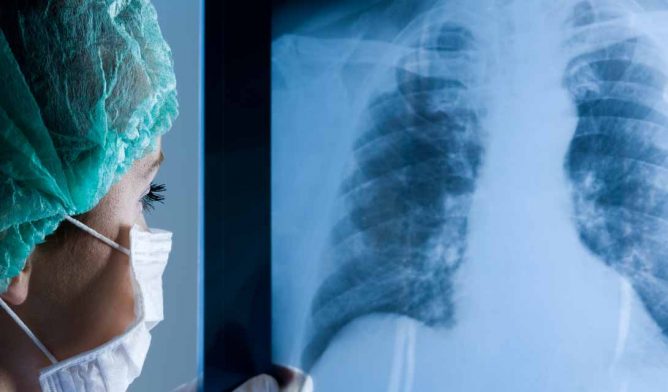Is Pleural Mesothelioma Becoming a Chronic Illness?
Treatment & DoctorsWritten by Dr. Loic Lang-Lazdunski | Edited By Walter Pacheco

Finding the right specialty center can make a world of difference for a patient diagnosed today with malignant pleural mesothelioma.
This is where hope is real, where prolonged survival is becoming the norm.
Despite what they may have read or heard — from their doctor sometimes — patients should know that pleural mesothelioma is becoming a chronic disease, not a rapidly fatal one. Patients can live with mesothelioma, much like they live with diabetes or heart disease.
Many of my patients are living completely normal lives, well beyond five years after mesothelioma surgery.
One patient I have is 10 years following surgery, and she is travelling extensively, enjoying her life. Another is more than seven years down the line, and we still go fly fishing together every year.
One man, whom I chatted with just a few days ago, lives on an island off the British coast. He was told in 2007 he had maybe one year to live.
Now, 13 years after extended pleurectomy and decortication, radiotherapy and adjuvant chemotherapy, he enjoys life with his family. He has been coming for his annual follow-up year after year, waiting confidently for the results of his PET scan, with a smile on his face.
Many Benefits to Aggressive Mesothelioma Surgery
Some may argue that they have seen mesothelioma patients survive long without surgery. This is true, but it just happens less often than with surgery.
Radical, well-performed surgery, done with the right team, has played a role in what is happening with this disease, although I still hear doctors telling patients that mesothelioma cancer is just not a surgical disease.
I believe that diverting a potentially operable patient from surgery is denying a chance of a cure or prolonged survival. It is a bit like saying to a stage I or stage II lung cancer patient that he or she shouldn’t have surgery because there’s only a 50% chance of survival at five years. That’s crazy.
In addition, the psychological benefit — the relief — of having the tumor removed should not be underestimated. It may or may not have to do with the placebo effect, but giving patients hope is extremely important to me. It is a bit like being given a second chance after failing a test.
Lots of patients or families send me cards, even when they are not doing so well, saying they would do exactly the same thing if they had the choice again. They say I was the only light in their darkness offering a bit of hope.
Lang-Lazdunski Not Alone in Views on Mesothelioma
I know lots of colleagues and mesothelioma experts — and friends — like Dr. Raja Flores, Dr. Joe Friedberg or Dr. Marc de Perrot, who share my views. It is important to remember why we became doctors. Giving hope as well as accurate and honest information is part of our duty as doctors.
Surgery definitely can make a difference. This has now been formally recognized by ASCO, IMIG and other organizations that have incorporated extirpative surgery into their guidelines for the management of patients with malignant pleural mesothelioma.
Personally, my surgical technique has not changed much over time. I perform a total pleurectomy and decortication, aiming for complete macroscopic resection, along with a pleural lavage for 20 minutes with the antiseptic povidone-iodine.
It is extremely cytotoxic to mesothelioma cells. It works in the lab and I believe it works for patients. In more than 15 years now, we have not seen complications directly related to the use of povidone-iodine in the pleural cavity.
Mesothelioma Surgery Results Impressive
My results were presented at the World Lung Cancer Conference 2019 in Barcelona and will be published soon: 150 patients (2004-2018) operated on consecutively. All patients but one received prophylactic chest wall radiotherapy, and systemic chemotherapy was given before or after surgery per the oncologist’s choice.
In 90% of the patients I was able to spare the hemidiaphragm, which helped make a difference in terms of complications, survival and quality of life.
There was no mortality at 30 days and 90 days in our series. This is the lowest mortality reported to date worldwide. I believe it shows that when surgery is performed by a mesothelioma specialist in the right environment, with experience all around (thoracic anesthetist, intensive care staff, cardiothoracic nurses, dedicated physiotherapist), it is safe and can be life changing.
Surgery is no cure, but it does move the clock back in time for mesothelioma patients and provides an invaluable survival benefit. In addition, mesothelioma tumors are frequently heterogeneous, with different cell populations in different areas.
Therefore, removing all tumors allows our pathologists to have the full picture, as opposed to small biopsies that provide a small print only. We can provide lots of tumor tissue for research and complex genomic analyses, which is really helpful in predicting outcomes and helping select future therapies. Thus, it is a double bonus.
We showed a median survival of 34 months for patients with epithelioid histology and 18 months for those with non-epithelioid histology.
By comparison, median survival was 11 and six months, respectively, for those not undergoing surgery in the British mesothelioma registry. Of course, our patients were carefully selected and those in the British mesothelioma registry were not. This may account for the difference as well.
More Treatment Combinations Available for Patients
There is a lot more to integrate today in combination with surgery, which alone is often not an adequate mesothelioma treatment.
We live in an era of personalized medicine and more second- and third-line treatment possibilities are available.
Recent studies have shown that the immunotherapy combination of ipilimumab and nivolumab provides a survival advantage over chemotherapy (KEYNOTE 743, recently presented at the 2020 ASCO meeting). The MAPS2 trial published two years ago had shown excellent results with this combination in unresectable mesothelioma.
Now, the upcoming trials that will include radical surgery with that immunotherapy combination will be watched closely.
We know that immunotherapy works best with minimal tumor burden, so it makes sense to combine both and have patients on maintenance immunotherapy following surgery.
A patient who may not be a candidate for surgery upfront may become a surgical candidate months later following successful induction therapy.
I believe that patients with non-epithelioid cell types will benefit most from immunotherapy as they are the ones not doing so well at present. The combination of ipilimumab and nivolumab may really change the game for these patients, as shown in the KEYNOTE 743 trial.
Multidisciplinary Team Concept of Mesothelioma Treatment
With each patient I see, I develop a long-term plan from the beginning, based on biology, gene mutations found in the tumor and consultations with oncologists. I strongly believe this is why patients do best at large-volume facilities. A surgeon may know how to perform the surgery, but if the volume there is low, they won’t know everything that is available to the patient.
People also have to realize they could have the best surgeon, but it’s the team that matters most. Thus, patients will be dependent on the skills of the anesthetist, on critical care nurses looking after them initially, on nurses working in the surgical ward, on physiotherapists and others.
Then, they will benefit from multidisciplinary consultations. Expert mesothelioma treatment centers will often offer interesting clinical trials, allowing patients to access new drugs for free.
Centralizing Treatment for Mesothelioma
That’s why I believe we should have only a few national centers doing these surgeries — centralized mesothelioma surgical centers. This is what we are aiming for in Quebec now. We have assembled a team here with extensive experience in the field: Pulmonologists, thoracic surgeons, oncologists, pathologists.
I agree with Dr. Paul Sugarbaker’s recent comments that the United States should have no more than five centers doing mesothelioma surgery in the optimal way. Centralization is key. It has proven effective for other cancers such as esophageal carcinoma.
It’s better to have one surgeon doing 50 operations a year than to have 50 surgeons doing one each. Dilution is not good.
There is certainly a center volume effect, especially when it comes to complex cases and management of complications. By grouping expertise and resources, cost is reduced and effectiveness and safety improved.






